Hope as new Covid-19 pill reduces chance of death

Capsules of the experimental antiviral drug Molnupiravir.
Imagine if there was a pill to treat Covid-19 instead of getting admitted to hospital and doctors struggling to find a vein to administer medication?
On Friday, scientists announced positive results on a study designed to find out whether a new oral experimental antiviral drug has stirred hope that Covid-19 could be treated by a pill.
The drug known as molnupiravir was developed for the treatment of influenza and has now been found to reduce chances of hospitalisation or death by half for patients at risk of severe disease, according to interim clinical trial results announced on Friday.
If authorised, molnupiravir would be the first oral antiviral medication for Covid-19. So far, only antibody cocktails - which have to be given intravenously - are approved for treating non-hospitalised Covid-19 patients.
Genetic code
The drug, molnupiravir, is administered orally and is designed to inhibit the replication of the coronavirus in the body by introducing errors into the genetic code of the SARS-CoV-2 virus would be the first oral antiviral medication for Covid-19.
According to the American multinational pharmaceutical company Merck & Co Inc which developed the drug, Phase 3 trial dubbed MOVe-OUT trial has been stopped early due to the positive results seen in mild or moderate Covid-19.
Merck in partnership with another US based company, Ridgeback Biotherapeutics, Friday announced that it plans to apply for emergency use authorisation (EUA) for the pill ‘as soon as possible’, and to submit applications to regulatory agencies globally.
“With these compelling results, we are optimistic that molnupiravir can become an important medicine as part of the global effort to fight the pandemic and will add to Merck’s unique legacy of bringing forward breakthroughs in infectious diseases when they are needed most,” said Robert M. Davis, Merk’s chief executive officer, and president.

Pharmaceutical company Merck employees at the firm in Summit, New Jersey. Merck said yesterday it will seek authorisation in the US for an oral drug for Covid-19, after the pill showed “compelling results” in a clinical trial. The experimental drug, molnupiravir, significantly reduced the risk of hospitalisation or death.
An interim analysis of 775 patients in the Merck's study found that 7.3 per cent of those given molnupiravir were either hospitalised or had died by 29 days after treatment, compared with 14.1 per cent of placebo patients. There were no deaths in the molnupiravir group, but there were eight deaths of placebo patients.
Antiviral treatments
The study participants had laboratory-confirmed symptoms of Covid-19 and were randomly given molnupiravir or a placebo within five days of symptoms.
“Antiviral treatments that can be taken at home to keep people with Covid-19 out of the hospital are critically needed,” Wendy Holman, Ridgeback's CEO, said in a statement.
A placebo is a substance or treatment which is designed to have no therapeutic value. It could be a pill, a shot, or some other type of "fake" treatment. What all placebos have in common is that they do not contain an active substance meant to affect health. Researchers use placebos during studies to help them understand what effect a new drug or some other treatment might have on a particular condition, WebMD explains.
In the trial, which enrolled patients around the world, molnupiravir was taken every 12 hours for five days. According to the study, molnupiravir was also found to be effective across Covid-19 variants like Gamma, Delta, and the newly discovered Mu.
10 million courses
Merck said it expects to produce 10 million courses of the treatment by the end of 2021, with more doses coming next year as it has a US government contract to supply 1.7 million courses of molnupiravir at a price of $700 ( about Sh77,350) per course.
Other pharmaceutical companies like Pfizer and Swiss pharmaceutical Roche are also racing to develop an easy-to-administer antiviral pill for the disease which has infected about 219 million and led to the demise of 4.5 million people worldwide. In Kenya, an estimated 249,725 had tested positive and 5,128 people succumbed to the disease as of October 1.
The news comes days after a study (on 500 patients) published in the New England Journal of Medicine on August 18 showed that the use of convalescent plasma treatment for high-risk patients early in the disease was not as effective as earlier thought.
Covid-19 convalescent plasma has been used at Kenyatta University Teaching Referral and Research Hospital (KUTRRH) as an experimental therapy for a number of patients. Treating Covid-19 patients with convalescent plasma infusions was thought to help fight the virus after studies suggested that the treatment might lower the risk of death among hospitalised patients if administered early in the disease — before mechanical assistance was needed to help them breathe.
Block the virus
In theory, it could speed recovery by transferring antibodies that could block the virus. The approach is called passive immunisation. The therapy uses blood plasma collected from patients who have recovered from the virus. It’s sometimes known as “survivor’s plasma.”
In the NEJM study, the research team found there was no significant difference in disease progression between the plasma group and those given a placebo. The trial was stopped in February 2021 due to the lack of treatment efficacy.
“The results show that convalescent plasma does not appear to benefit this particular group,” says study co-author Dr Nahed El Kassar of NHLBI. “But the findings answer an important clinical question and may help bring researchers a step closer to finding more effective treatments against this devastating disease.”
With the introduction of variants, the convalescent plasma treatment was also suspended at the KUTRRH as researchers awaited fresh approvals from the Pharmacy and Poisons Board (PPB) to continue the trials to study whether or not the therapy is effective on the new Covid-19 variants.





